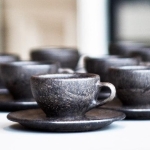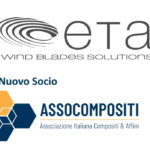For every cup of coffee you drink, around two tablespoons of coffee grounds winds up in the trash. That might not sound like a lot but, but multiply that by millions every day in cafés and restaurants around the world, and that’s a serious mountain of landfill fodder.
It was mulling over this problem that gave German product designer Julian Lechner a curious idea. What if instead of getting buried into garbage bags, old coffee grounds could be recycled into something useful and sustainable?
The result was Kaffeeform, a company producing espresso cups and saucers made from dried coffee grounds and biopolymer. Resembling stoneware, the vessels are light and easy to pick up, made of smooth-textured, durable material that’s both unbreakable and dishwasher friendly.
Lechner began talking to his teachers about what materials could be mixed with the grounds to create a solid material. It was years before he would eventually partner with a German research institute and develop with a substance that could be blended with the grounds.
Lechner knew he needed drinkware that would survive getting sloshed in a dishwasher and still be reusable. Finally, in 2014, he found the perfect formula by blending grounds with wood grains and a biopolymer of cellulose, lignin, and natural resins.
After just over a year in business, Kaffeeform can’t keep up with the demand, routinely selling out of its stock through its website. It’s also available in ten shops across Europe.
Kaffeeform cooperates with an organization called Mosaik Berlin, which pairs up small businesses with workers who are mentally and physically disabled, providing them with pay and job experience.
Grounds are picked up in the morning from three roasters in Berlin and brought to Mosaik’s headquarters. There, they’re dried and compressed for two hours in a special oven by workers, and then packaged up into 400-kilogram bags. From there, the grounds are shipped to a factory in another German state, Baden-Württemburg, where they’re mixed with wood grains, biopolymers, and all the natural fibers. The blend is transferred to Cologne for melting and compression into molds. Eventually, the final product—dainty cups and saucers for sipping espresso—are brought back to Mosaik, where customers package the cups into reused coffee bags and ship them out to customers. For every cup, around six servings of grounds gets recycled.













